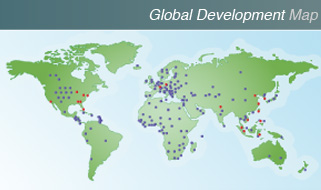-
"If GE's strategy of investment in China is wrong...
Posted: April 14th, 2010
...it represents a loss of a billion dollars, perhaps a couple of billion dollars. If it is right, it is the future of this company for the next century."
- Jack Welsh
China,…the very word conjures up images of vast numbers of people; ancient wisdom, Terra Cotta warriors; and now, relentless global expansion and growth. A country which until recently did not even believe in personal property, now demands that companies rethink how they view their world wide intellectual property as they eye China's enormous internal markets. "A riddle wrapped in an enigma, shrouded in mystery" indeed.
Neuralstem has been eying the China market for some time. Over a year ago James Sasser, former Ambassador to China joined our advisory board. Dr. Karl Johe, our Chairman and Scientific Founder has traveled extensively in China, and conferred with many of the leading scientific voices in the county. We have created partnerships in the area; a licensing option deal with CJ Corp of South Korea covers South Korea, Vietnam, Indonesia, Malaysia and Singapore; but to date we have not made a deal in China. Yet China remains in many ways central to our growth and the commercialization of our technology worldwide.
For years, China has represented the most liberal end of the spectrum with respect to allowing medical treatment with stem cells, of all types. They have allowed these treatments with practically no "adult supervision" as we in the West would view it. This complete lack of a regulatory framework has led to an unruly landscape. A series of exposes in a Milwaukee newspaper recently chronicled some of the worst abuses. Last fall, in an effort to change the growing perception worldwide, that China simply didn't care about real science, all stem cell transplantations were halted, and a new "certification" process was put in place. Hospitals and researchers are expected to begin to emerge from this "process" with their certifications this spring. As always in China, there are regional and national pressures and powers involved. But slowly, surely, a true regulatory framework for human trials and commercialization of therapeutics will take shape. Neuralstem is well positioned to take advantage of this new order, and to work with the top hospitals and research institutes in China as this new order finally takes shape.
Not enough detail has emerged yet to predict how long the process will take in China. We will have to establish that our cells provide benefits to patients and are safe, in China, just like anywhere else. But it is almost certain that once we have demonstrated that, we will be selling product in China, years before we will be selling product in the United States. We are not working in China just to "bring back" the data to the U.S. China and the U.S. are two separate and independent markets, and we are pushing forward in both.
I do not mean to understate the regulatory and business challenges that China creates, they are enormous. The recent well chronicled problems of Google in China show how complex it can be for western companies to do business there. Yet it is also clear that the path to commercialization for a stem cell product in China will be much quicker than almost anywhere else on earth. The economics of treating patients will be different in China, but the opportunities presented by their markets are equally unique. China has for instance, literally dozens of cities each as large or larger than New York City, and in each of those cities there are new, "western style" hospitals to serve the new upper and middle class demand for cutting edge western style medicine. This new "slice" of the China market is our initial target, and it is these very hospitals that are all closely aligned with the most advanced research centers in China, and most likely where our clinical trials will take place.
But no path in China is ever straight forward, and certainly none can be navigated from afar. And so we plan to open Neuralstem China this year, to make sure that we have everything in place on the ground to push forward with the best partners. When we do make deals there, on both the business side as well the science and medical sides they will be from a position of strength, and from an intimate knowledge of the new regulatory framework and business opportunities. As the inestimable Mr. Welch realized, one must devote serious resources in order to prepare to do business in China. When that investment pays off however, it will constitute a huge part of our future. And perhaps even more importantly, it will likely bring the future here much much sooner.






